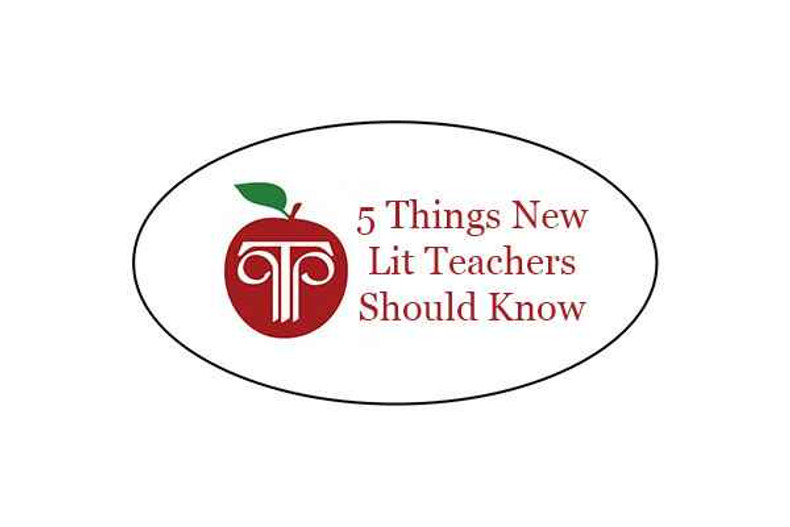Some things would have been good to know in my early years of teaching literature. Here are five of them (in no particular order; they're all important):
1. You Don't Have To Know EVERYTHING.
First of all, it's impossible for you to know everything about a work of literature and the author. As a new teacher, I wanted to give my students all the interesting nuggets and fun facts about the work, as my college professors had given me. I was so frustrated and felt so dumb when I had to teach books that no one had ever taught me.
The news flash is that your college professors (and the teacher with 25 years of experience down the hall) didn't know all that stuff as new teachers, either. They learned it over time, and you will too.
You can do a good job of teaching a work of literature by just knowing the basics about the book and author and knowing some good principles of teaching literature.
2. Know Your Audience.
How you go about teaching a work of literature depends somewhat on your students. Are they good readers or poor readers? Do they like to read or not? Are they a talkative bunch who thrive on discussions, or are do they need written work to reinforce key elements? There's no use planning big discussion sessions if your students are mum no matter what you try to do to motivate them to talk, and there's no use assigning chapters to be read at home if your students need help sounding out and understanding words.
Teaching literature isn't "one size fits all." You have to approach it with your audience, your students, in mind.
Maybe they'll open up and discuss things in small groups or pairs more than in front of a whole class. Maybe they'll do better with discussions if they have related projects or time to prepare ahead of time.
If you don't know your students' strengths and tendencies, make it a point to find out as you test different teaching and learning methods--and find out as quickly as you can. What works well with one class may fall flat with another.
3. Cover the Basics.
If you don't know where to start, it's usually a good idea to start with basic comprehension and then the basic elements of fiction.
Make sure students understand literally what they have read--what the words on the page actually said. What actually happened? Who was involved?
Character, plot, setting, conflict, theme, style, and literary devices (the elements of fiction) are the basis of the story. You can and should spend time exploring these elements.
After that you can go on to discuss nuances, historical context, author's biographical influence, comparisons with other works, and more.
4. Unit Projects Usually Help.
Unit projects serve several purposes.
- They allow for more in-depth exploration of some aspect of the book.
- They can give students the opportunity to work together to accomplish something. Occasionally allowing class time to work on the project(s) breaks up what could otherwise perhaps be a rut-like routine of reading, discussing, reading, discussing, reading, discussing.
- Often unit projects will tie together various themes or elements of the story--or will in some way make the story more relevant to students' own personal lives.
- To achieve the goal of the project, students often have to use information gleaned from the story. The project then becomes a way to make the information from the story useful to achieve a goal other than just to "read the book."
Adding a project takes extra planning time and can take a significant amount of grading time, especially if the project is a research project with a written component.
Carefully construct projects to achieve certain goals rather than just assigning projects for the sake of having projects. Design the projects to be graded on certain criteria. As you construct the project(s), keep in mind not only students' time but your needed evaluation time, too.
5. Decide What's Important.
Know why you are teaching the book and what the most important thing for your students to learn from it is. That helps everything else fall into place.
This depends on your curriculum guidelines and on your students. For example, when your mostly below-average class reads Macbeth, they will necessarily relate to the story differently than your Advanced Placement class. You may use a different text. You may focus on different elements. The AP class may have a more scholarly approach whereas the below-average class may have a more practical approach.
The real key is to decide what your students should gain from reading the work of literature--and what skills and information are most important for your students to work on or work with during your novel unit. These goals will be your framework for activities, projects, discussion points, writing assignments, and more.
As the teacher, you have the ability--and duty--to craft the best unit of study that you can for your students. You don't have to know everything about the book you are teaching, but you do have to know your students and be able to determine how to help them get the most out of reading the book.
As you start your teaching career, know that each unit of study doesn't have to be perfect. It doesn't have to be a Grand Thing. It just has to help your students learn something about life and improve their skills. You can do that.
As you gain experience, you'll learn how to craft your units better. You'll learn more about the books, more about students, more about teaching, more about yourself. For now, follow the basics, and you'll be fine (and so will your students).




